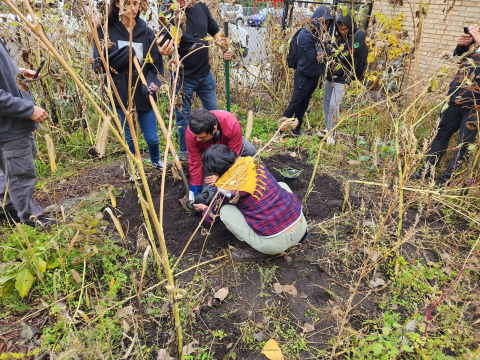Students planting Wiingashk (sweet grass) @ Nawayee

Students planting Wiingashk (sweet grass) @ Nawayee
- Accredited junior and senior high school classes
- Medicine Wheel Health program that addresses Mental, Physical, Spiritual and Emotional health
- Youth leadership through a joint decision-making partnership between staff and students
- Opportunities to develop and strengthen cultural pride through culturally contextualized learning environment
- Small classes that allow students to learn more about their culture such as Ojibwe/Dakota Language, Cultural Arts, Indigenous Musical Traditions.
- Summer school that features gardening, plant wisdom and outdoor education.
Current Programs:
MEDICINE WHEEL HEALTH PROGRAM
Our Medicine Wheel health program employs a culturally contextualized approach to addressing the Mental, Physical, Spiritual and Emotional health of our students, staff and community. In partnership with several community partners, such as the Native American Community Clinic, Minneapolis Indian Center and New Native Theater , to name a few, We work to collaboratively to address the needs of our students and the larger school community by providing a wide spectrum of health related services. These services include, but are not limited to : Counseling, therapy and therapeutic arts, academic support, housing and transportation support, indigenous languages instruction, immersion in Indigenous plant wisdom and culturally contextualized classes facilitated by teachers trained in trauma-informed classroom who can identify student needs and work collaboratively with our Medicine Wheel staff and community partners. Together this healing community endeavors to address trauma co-creatively and to develop solutions and build resilience. Students not only learn to recognize their own trauma but how to heal themselves and help others do the same.
The primary focus for all of these efforts is understanding the science of relatedness. (A coherent understanding of universe as interrelated) and most of our work is done within the context of relationships.
It is the understanding that all things are related that lies at the heart of our Medicine Wheel program, the understanding being that the better we relate to the people and events in our lives the healthier we become .
Medicine Wheel Health is more than a program. It is a learning journey that we take in company with all of our relatives across the length and breadth of Turtle Island.
Healthy Choices Program
The Healthy Choices Program provides an integrated approach that includes:
1) Screening and follow-up: The Native American Community Clinic provides four screenings per year. NACC also provides consultation services on data gathering and management, and speakers on health education issues. Screenings are conducted in a health fair format that encourages attendance and provides students with access to more information and opportunities. Students with high-risk indicators such as obesity or a family history of diabetes, and those demonstrating abnormalities in tests are followed closely by the home/school liaison and by NACC.
2) Nutrition education and healthy meals: Students are encouraged to make healthier choices through nutritional information presented in the context of Native American culture. Students now drink less than two sugary drinks per day, a significant change. The school serves healthy meals through a contract with a private caterer. We see a substantial increase in the number of students requesting and eating whole foods such as fruit and vegetables and grains.
3) Exercise: Our students have less access to organized athletics or activities that require transportation or equipment. We developed a varied exercise program to adress that need. This includes basketball, weight training, yoga, drumming, dancing and outside activities that include orienteering, canoeing, biking and rock climbing. We partner with several local organizations to provide regular opportunities for structured exercise and fitness training. Students engage in physical activity at least five hours per week with many students exercising eight hours per week. The entire school participates in the annual spring Mde Maka Ska, a celebration of the sacred Native connection to water and canoes at Lake Calhoun.
4) Health Education: Health education includes general health and reinforces the importance of exercise and abstinence from alcohol, drugs and cigarettes. The curriculum looks at health holistically, as we focus on mental, physical, emotional and spiritual health. Our health curriculum includes bringing in guest presenters who share their knowledge and experiences of striving for good health.
5) Garden: Launched in 2006, the Indigenous Garden engages students in growing their own food. Students also worked with area artists to design and paint a large mural on the south wall next to the garden. New components are added each year. The garden has received awards and recognition from the National Garden Association, the Minnesota State Horticultural Society, the StarTribune and other local media.
Experiential Learning Program
Experiential programing includes adventure-based opportunities including backpacking, canoing, rock climbing and kayaking as well as an integrated field trip program where coursework in the academic subject areas is enriched with creativley structured field experiences such as: water quality testing in local streams and lakes, outdoor astronomy lessons, visits to Indigenous sacred sites and attendance at local productions of plays, stories and books studied in Literature clases.
There is also a well-developed Internship program where students can build their resumes and gain valuable experience in the work force learning life and job-specific skills. The idea behind it is that our students learn best from experience and when immersed in the subject material through a multi-faceted teaching and learning approach. The internship program offers paid internships linked to classroom credits to help them prepare for life beyond graduation.
